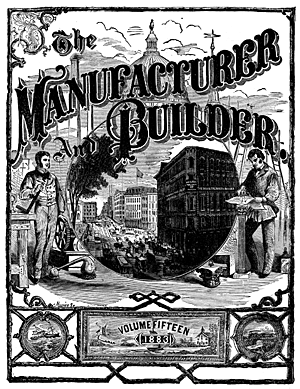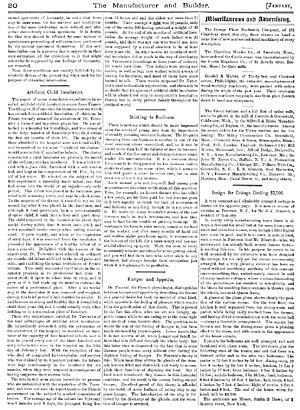

|
|
The report of some remarkable experiments in so-called artificial child incubation
comes from France. The Glasgow Mail says that the immense success which has attended
the artificial incubation of chickens in France recently attracted the attention of
Dr. Tavernier [sic], a learned and ingenious physician. He was attached to a hospital
for foundlings, and was annoyed at the large number of foundlings that died within
the first six months of their life. The majority of those admitted to the hospital
were weak and sickly, and he resolved to try what "artificial incubation" would
accomplish if applied to infants. The doctor constructed a child incubator on
precisely the model of the ordinary chicken incubator. It was a box covered with
a glass slide, furnished with a soft woolen bed, and kept at the temperature of 86 ° Fah.,
by the aid of hot water. He selected as the subject of his first experiment a
miserably made infant, one that had come into the world at an injudiciously
early period. This infant was placed in the incubator, provided with a nursing
bottle, and kept in a dark room. To the surprise of the doctor, it ceased to
cry on the second day after it was placed in the incubator, and although it had previously
been a preternaturally sleepless child, it sank into a deep and quiet sleep. The
child remained in the incubator for about eight weeks, during which time it never
once cried, and never remained awake except when taking nourishment. It grew
rapidly, and when, at the expiration of sixty days, it was removed from the incubator,
it presented the appearance of a healthy infant of at least a year old. Delighted
with the success of the experiment, Dr. Tavernier next selected
an ordinary six-months-old infant addicted to the usual pains and colic,
and exhibiting the usual fretfulness of French infants. This child conducted itself
while within the incubator precisely as its predecessor had done. It never cried; it spent
its whole time in sleep, and it grew as if it had made up its mind to embrace
the career of a professional giant. After a six weeks' stay in the incubator, it
was removed and weighed, during this brief period it had doubled its weight. It
had become so strong and healthy that it resembled a child three years old, and
it could actually walk when holding on to a convenient piece of furniture.
These two experiments satisfied Dr. Tavernier of the vast advantages of
artificial child incubation. He immediately proceeded, with the permission
of the authorities of the hospital, to construct an incubator of the capacity
of four hundred infants, and in this he placed every one of the three hundred and
sixty infants who were in the hospital on the 10th day of February last. With
the exception of one who died of congenital hydrocephalus, and another who
was claimed by its repentant parents, the infants were kept continuously in
the incubators for six months, when they were removed in consequence of having
outgrown their narrow beds.
The results will seem almost incredible to persons who are unfamiliar with
the reputation of Dr. Tavernier, and have not seen the report made to the
French government on the subject by a select committee of twelve. The average
age of the infants last February was 8 months and 3 days, the youngest being
less than 12 hours old and the eldest not more than 11 months. Their average
weight was 16 pounds, only one of the entire 360 having attained a weight
of 32 pounds. At the end of six months of artificial incubation, the average weight
of each infant was 24 pounds, and there was not one who would not have been
supposed by a casual observer to be at least three years old. In other words,
six months of artificial incubation did as much in the way of developing
Dr. Tavernier's foundlings as three years of ordinary life would have done.
The infants were strong and healthy as well as big; they walked within a
week of leaving the incubator, and most of them have since learned to talk.
These results surpassed Dr. Tavernier's most enthusiastic expectations,
and there can be no doubt that his system of artificial child incubation
will be adopted not only in every child's hospital, but in every private
family throughout the civilized world.
|

